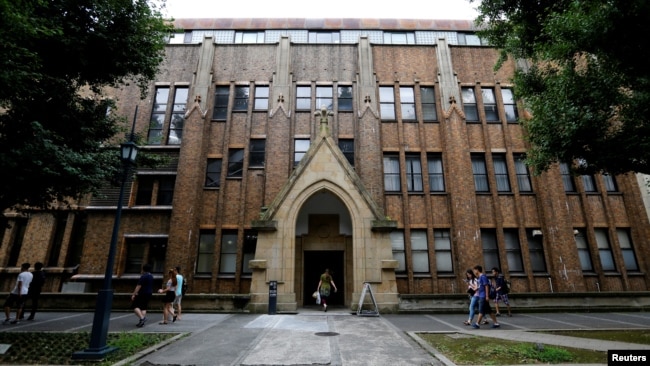日本、スパイ防止への取り組み
スパイ天国と称される我が国、署名だけで信じられるなんて・・・
研究という名目の国家による技術搾取の誘惑。
国家理念を疑うことはないのでしょうか?
それでも、規制しないよりはまし。
ますます、世界が二分化されていくように感じます。
VOAで英語を学びましょう!!
日本の大学におけるスパイ防止への取り組み(和訳)
Japanese Universities Try to Prevent Espionage
May 29,2022
日本は大学に対し、外国人留学生や教授の調査を強化するよう要請しています。
この要請は、中国などへの技術流出を防ぐための努力の一環です。この問題は、日本の国家安全保障にとっても、米国やヨーロッパの大学との交流を保護するためにも重要です。
多くの欧米諸国は、自国の大学でのスパイ行為を防ぐためにセキュリティ対策を拡充しています。
日本の政府関係者によると、米国で中国人研究者が相次いで逮捕されたことで、危機感を抱いたと言います。
「世界中で、中国のような外国に対する輸出規制が厳しくなっています。」と、日本のある匿名の通産省関係者は話します。この関係者は、学生やリスクの高い技術データをよりよく監視する方法について大学と協力しています。
「我々は日本の大学が、米国やヨーロッパとの共同研究が継続できるように、セキュリティや貿易管理について信頼されることを望んでいます。」とこの通産省関係者は語ります。
昨年、日本のメディアは、9人の中国人研究者が自国の防衛産業で働くために日本を離れたと報じました。彼らはミサイル技術を研究していました。
今月から施行された新しいガイドラインでは、大学は外国政府や防衛分野とつながりのある学生、教授、研究者を調査し、印をつけるよう求められています。
これまでは、機密情報や物品を海外に送ろうとした場合に限定されていました。
在日米国大使館は、この新しいセキュリティ対策を歓迎すると述べています。ロイター通信に電子メールで送られた声明では、米国は日本が両国の”現実的で深刻な”研究セキュリティの問題から守るのを助けるために新しい方法を探すと述べています。
日本政府のデータによると、2020年の日本の外国人大学生27万9597人のうち、中国人留学生は44%を占めました。日本の研究者の留学先としては、2019年は米国がトップで、中国がそれに続きました。
効果について
しかし、新制度がどの程度の効果を発揮するのかについては疑問が残ります。また、一部の学識経験者は反対しています。
東北大学で輸出管理を統括している佐々木隆彦氏は 、教授から署名入りの同意書を求めると述べています。署名することによって、教師は特別に許可されない限り、外国政府とつながりのある人々に機密技術を教えないことを約束するのです。
これは、外国人教員や学生に対して、日本の輸出管理規則に従うことを書面で約束するよう求める既存の方針に追加されることになるとこの輸出管理統括者は言います。
佐々木氏は、「私たちは諜報員ではありません。履歴書と学歴をチェックしますが、それは大学としての仕事の範囲であるべきです。 "と付け加えました。
Japanese Universities Try to Prevent Espionage
Japan is asking its universities to better investigate their foreign students and professors.
The request is part of an effort to prevent technology leaks to places like China. The issue is important for Japan’s national security and for protecting exchanges with the United States and European universities.
Many Western countries have expanded security measures to prevent spying at their universities.
Japanese officials say a series of arrests in the U.S. of Chinese academics created a sense of urgency.
"Around the world, export controls are getting more stringent on foreign nations like China," said a Japanese trade ministry official who did not want to be identified. The official works with universities on ways to keep better watch on students and high-risk technology data.
"We want Japanese universities to be trusted for their security and trade controls so that joint research with the United States or Europe can continue," the trade ministry official said.
Last year, Japanese media reported that nine Chinese researchers had left Japan to work in the defense industry back home. They had studied missile technologies.
New guidelines
Under the new guidelines, effective this month, universities are being asked to investigate and flag students, professors and researchers who have ties to foreign governments or the defense field.
In the past, such investigation had been limited to cases of people trying to send sensitive information and goods overseas.
The U.S. embassy in Japan said it welcomed the new security measures. In an emailed statement to Reuters, it said the United States would look for new ways to help Japan protect against what it called "real and serious" research security problems in both countries.
Japanese government data shows that Chinese students made up 44 percent of Japan's 279,597 foreign university students in 2020. The United States was the top destination for Japanese researchers, followed by China, in 2019.
Effectiveness
But questions remain over how effective the new system will be. And, some academics are opposed to it.
Takahiko Sasaki oversees export controls at Tohoku University. He said it will seek signed agreements from professors. By signing, the teacher promises not to teach sensitive technology to people with ties to foreign governments, unless specially permitted.
That would be on top of an existing policy asking foreign faculty and students to submit a promise in writing to follow Japanese export control regulations, he said.
Sasaki added, "We are not intelligence operators. Checking resumes and academic records - that should be the extent of our job as a university."
Words in This Story
academic – n. a person who is a teacher in a college or university
stringent – adj. very strict or severe
resume – n. a short document describing your education, work history, etc., that you give an employer when you are applying for a job
